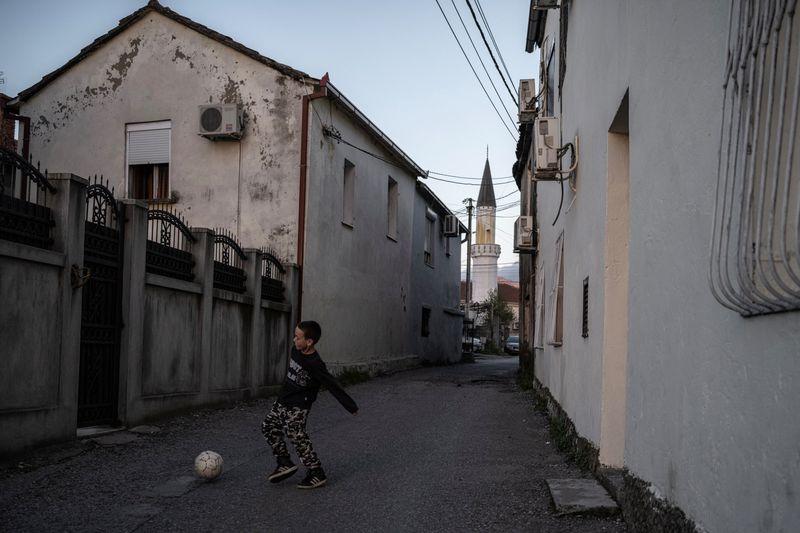
© Reuters. A child plays with a ball on a street, a day before the second round of presidential elections in Podgorica, Montenegro, April 1, 2023. REUTERS/Marko Djurica
2/5
PODGORICA (Reuters) – Montenegrins went to the polls on Sunday in a run-off presidential election pitting incumbent Milo Djukanovic against a Western-educated economist pledging to lift the nation out of a crisis marked by no-confidence votes in two governments.
Polling stations opened at 7 a.m. (0500 GMT) and will close at 8 p.m. (1800 GMT). First unofficial results by pollsters, based on a sample of the electorate, are expected about two hours later.
Voter turnout stood at about 39% by 1 p.m. (1100GMT), said the Podgorica-based Center for Monitoring and Research (CEMI).
Djukanovic, 61, has dominated Montenegro as president or prime minister for 33 years since the start of the collapse of the now-defunct federal Yugoslavia. He led Montenegro to independence from a state union with much larger Serbia in 2006 and to NATO membership in 2017. The country is also a candidate to join the European Union.
“I believe that a new and better time is beginning in which Montenegro will continue to move efficiently and steadily towards its European goal,” he told reportes after casting his vote at a school in Podgorica.
Opponents have long accused the former communist and his Democratic Party of Socialists (DPS) of corruption, ties with organised crime and running the small Adriatic republic as their fiefdom – allegations they deny.
Djukanovic’s rival is Jakov Milatovic, 37, a Western-educated, former economy minister and the deputy head of the Europe Now movement that has pledged to curb graft, improve living standards and bolster ties with the EU and fellow ex-Yugoslav republic Serbia.
“I am absolutely convinced that I will become the new president of the country, that … the citizens of Montenegro will send the current president to the political past,” Milatovic told reporters after voting.
TIGHT RACE EXPECTED
Djukanovic wound up with 35.37% of the vote in the first round of the election on March 19, with Milatovic on 28.92%, necessitating a run-off because neither garnered a 50% majority. Analysts have predicted a tight race in the run-off.
Sunday’s vote follows a year of political instability in which two governments were felled by no-confidence votes. It was also marked by a dispute between lawmakers and Djukanovic over his refusal to name a new prime minister.
On March 16 Djukanovic dissolved parliament and scheduled snap elections for June 11. Although the presidential post in Montenegro is largely ceremonial, victory in the election would bolster the chances of the winner’s party in June.
Montenegro, which mainly relies on revenue from tourism along its scenic coast, has a legacy of bitter divisions between those who identify as Montenegrins and those who see themselves as Serbs and are opposed to the country’s independence.
The country joined NATO after a 2016 coup attempt that the Djukanovic government blamed on Russian agents and Serbian nationalists. Moscow dismissed such claims as absurd.
After Russia’s invasion of Ukraine last year, Montenegro joined EU sanctions against Moscow and expelled a number of Russian diplomats. The Kremlin has placed Montenegro on its list of unfriendly states.





